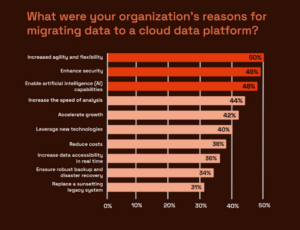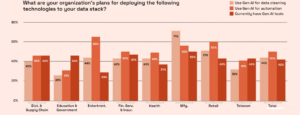(JLStock/Shutterstock)
One of the top reasons that companies are modernizing their data estates and moving to a centralized cloud data platform is to enable generative AI capabilities, Hakkoda says in its new study, titled “Generative AI State of Data Report.”
Hakkoda, which helps companies migrate data to Snowflake and utilize generative AI technologies, surveyed about 500 senior leaders in companies in eight industries for its report (available here). The survey results indicate that, while companies are already making big investments in GenAI, there is a lot of work left to do for companies to reach their ultimate data goals.
For instance, 42% of survey respondents said they’re already using GenAI tools today, and 29% said they have already transitioned to a centralized data platform. However, 74% of the survey participants indicated they’ll start the migration to a cloud data platform in 2024, while 85% said they are expecting to adopt GenAI this year.
The move to a centralized cloud data platform such as Snowflake, Databricks, or one of the cloud giants’ platforms, goes hand in hand with GenAI adoption, according to Hakkoda’s survey.
“Among organizations who had already made the jump to a centralized cloud platform in 2023, 48% said enabling Gen AI capabilities was a top reason for transitioning,” the company says in its report. GenAI was the number three reason behind achieving more agility and flexibility (cited by 50% of those who have already made the move) and better security (49%).
“The data is clear: modernization is happening now, and the power of Generative AI is a driving force,” the company says in its report. “Organizations looking to keep up with the competition and build an efficient, sustainable data stack know they’ll need the power and convenience of Gen AI in 2024 and beyond.”
Hakkoda unearthed a couple of other interesting data points in its study. For instance, one might think that large companies with deep pockets might be leading the charge in GenAI. In fact, Hakkoda’s data suggests that the top GenAI performers are somewhere in the middle: Big enough to have the means to sufficiently invest in GenAI, but small enough to still be agile.
“Organizations with less than $500 million in revenue surprisingly reported higher usage rates than much larger companies, the company says. “Organizations with 10,000 to 24,999 employees represent the sweet spot of AI deployment, outpacing larger and smaller organizations alike with a 49% usage rate. These organizations were 33% more likely to be deploying Gen AI than their larger peers, leading all organizations of any size in that capacity.”
Another interesting tidbit: manufacturers are leading the way in GenAI deployments.
According to Hakkoda’s report, 71% of manufacturers surveyed indicated they’re using or planning to use GenAI for data cleaning, which was 20% higher than any other vertical, while 59% said they’re using or planning to use GenAI for cataloging, which was also tops among industries. Manufacturers also are among the leaders in using GenAI for automation, with 56% of manufacturers indicating they do this, according to the study.
“Unsurprisingly, manufacturing organizations also reported the highest confidence in their defined and implementable Gen AI use cases, as well as in their internal data team’s ability to build the Gen AI capabilities their org needed,” Hakkoda says in its report.
Entertainment and retail organizations led all industries when it came to deploying Gen AI automation, the report says, and both industries were among the leaders when it came to using Gen AI for data cleaning.
Education, government, and healthcare are laggards when it comes to GenAI adoption. Leaders in these industries also expressed the lowest confidence that they have the talent to deploy GenAI, the report said.
At the end of the day, the book has yet to be written on GenAI, and there is much that is still in flux, Hakkoda concludes.
“Generative AI may be the term at the tip of everyone’s tongue in 2024, but most organizations are far from realizing its potential,” the company says. “While early adopters are working to implement discrete tools and perhaps even exciting their investor boards with shiny new offerings, the true winners of generative AI will be organizations that take a strategic approach to implementation, investing in both the modernization and the long-term data strategy that will allow their business to radically alter day-to-day operations.”
Related Items:
Data Quality Is A Mess, But GenAI Can Help
Enterprises Have Just Two Years to Harness the Full Potential of GenAI: Genpact and HFS Report
Top 10 Challenges to GenAI Success
Source link
lol



